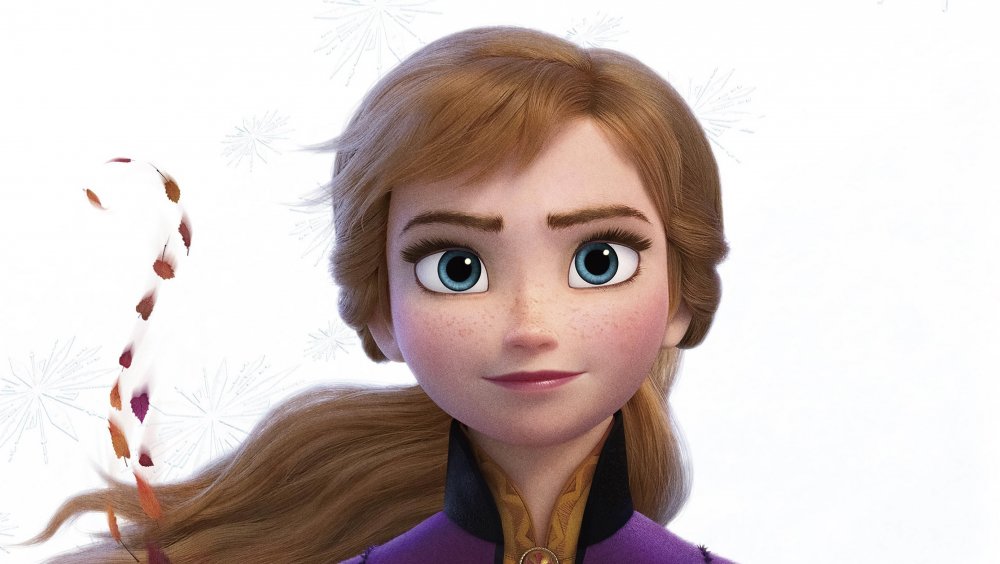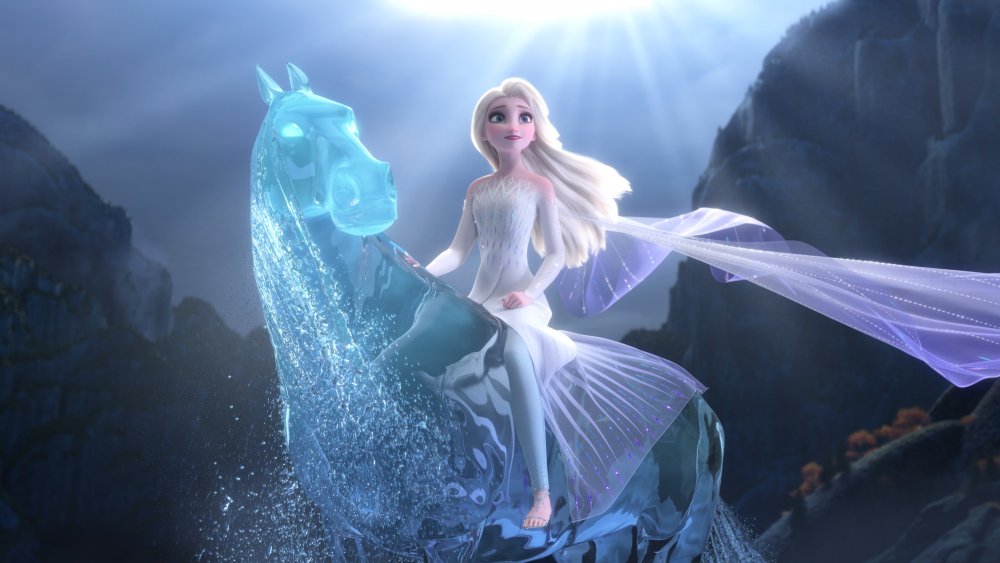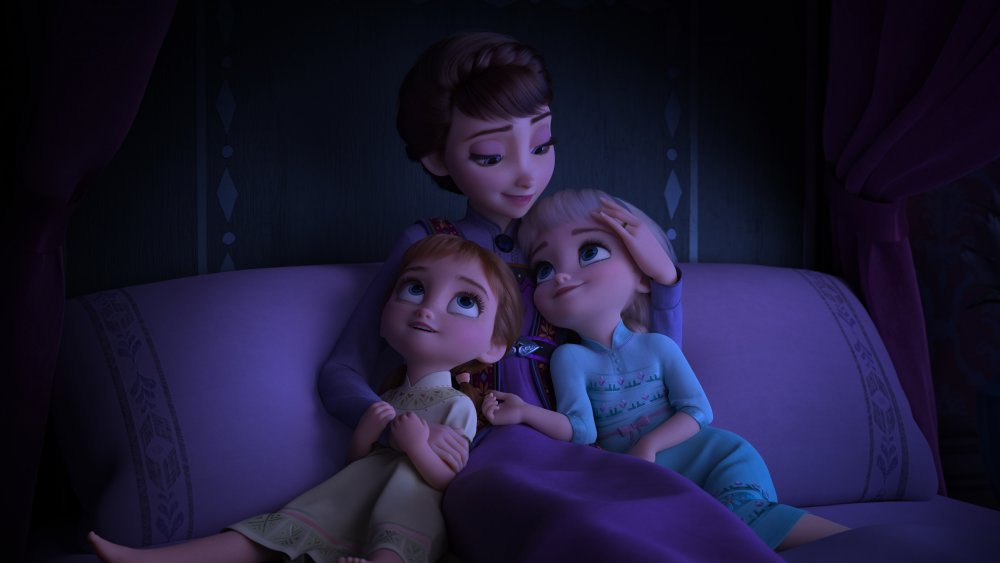The Real Reason Anna Doesn't Have Powers In Frozen
For many, the most memorable thing about Disney's smash hit Frozen is "Let It Go," an infectiously addicting song that's beloved by children and bemoaned by parents. Among the many other frosty and fantastical things that have made the female-centric 3D animated film such a success is the magic of its two leading sisters — literally.
In the first Frozen, Arendelle Princess Elsa (voiced by Idina Menzel) possesses magical abilities that give her the power to create and control ice and snow. But when a young Elsa accidentally hurts her younger sister, Anna (Kristen Bell), the King and Queen have a bit of an overreaction. They wipe Anna's memories, force Elsa to suppress her powers, and cut the two young girls off from the public — and each other. After their parents are lost at sea, Elsa steps into the role of ruler before accidentally revealing her powers to the court, earning the scorn of her subjects. She flees and builds herself an ice castle, and — in the process — unintentionally puts Arendelle under a cloud of eternal winter. Anna sets out to find her sister and is joined by an iceman named Kristoff (Jonathan Groff), his reindeer, Sven, and a cheerful and fast-talking snowman, Olaf (Josh Gad), brought to life by Elsa's powers.
The film was praised for its messages about female agency and sisterhood, but it also left viewers with one major question: If Elsa had powers, why didn't Anna? Frozen doesn't tackle that, but in its heavier-themed sequel, Frozen II, Disney gets fans a little closer to the truth. When Elsa hears a voice calling to her one night, she follows it and accidentally awakens four powerful elemental spirits. She and her squad set out to make things right with the elements, a quest that reveals the origins of Elsa's powers and her magical connection to her mother.
Frozen II reveals important backstory about Elsa's powers
In a flashback, Anna and Elsa's father, King Agnarr (Alfred Molina), recounts how he came into power, laying the groundwork for the powerful reveal about Elsa's power and her mother, Queen Iduna (Evan Rachel Wood). As the story goes, when a treaty between their grandfather, King Runeard(Jeremy Sisto), and the neighboring tribe of Northuldraalls falls apart, a battle ensues that kills Runeard and angers the elemental spirits — Earth, Fire, Water, and Air — of the Enchanted Forest. The spirits disappear, trapping everyone still alive inside the forest. Only young Agnarr makes it out with the help of an unidentified savior.
When Elsa, Anna, and the others venture out to find the source of the mysterious voice in Frozen 2, Elsa winds up at Ahtohallan, believed to be a mythical river. She discovers the River Ahtohallan completely frozen, which really makes it more of a glacier. This glacier supposedly contains all explanations of the past. At Ahtohallan, Elsa learns that the voice is an echo or memory of her mother, who was both attuned to the elements and the mysterious hero who saved her father when he was young.
Elsa learns that her powers are a gift from nature for her mother's selfless act of protecting her father, after flying him to safety with the help of the air elemental. What's more, Elsa can't just command the elements. The powers her mother was once so frightened by are proof that she's, in fact, the fifth elemental — a personification of humanity's balance with nature. Elsa's icy powers connect her to her mother, to the North, and the world's magical creatures, including the Earth Giants and the other elements.
It's now clear that Elsa is more like her mother, but who does Anna — Iduna's second child — take after?
Anna's lack of powers aren't explained, but fans have several theories
One of the bigger criticisms of Frozen II was how vaguely it broached the mythology of its universe, and, ultimately, how little it answered about Anna's magical relationship to her parents. Remaining vague about Anna makes sense, at least from a business perspective, as it preserves some narrative space for future movies. That points to the first reason Anna might not have powers like Elsa — we just haven't seen them yet. There are still things up in the air about Iduna's relationship to the elementals and even Elsa's powers, so it makes sense that Disney may be holding off another big reveal to help gin up enthusiasm for a third installment following Frozen 2's billion-dollar box office haul.
But beyond sequel potential, it could just be the movie playing into a whole host of tropes, including power dichotomies and mismatched sibling pairs. Anna and Elsa's personality profiles are already in opposition, and Elsa could be considered the physically stronger sibling due to her powers. Maybe Anna's power will be something more cerebral?
There's a third possibility out there, as well, and that is that both Anna and Elsa represent the balance between nature and humanity. Elsa is the physical manifestation of the link between humans and the magical elementals, while Anna is radically human. Within their relationship, Elsa represents the magic of their world, while Anna represents the non-magical people that also inhabit it. Like their parents — and like nature — Anna and Elsa are the balance needed to keep the peace.
Any or several of these theories could explain Anna's lack of powers, but with no clear answer from the film, fans will just have to wait to see if Disney delivers the goods in a third Frozen movie.


